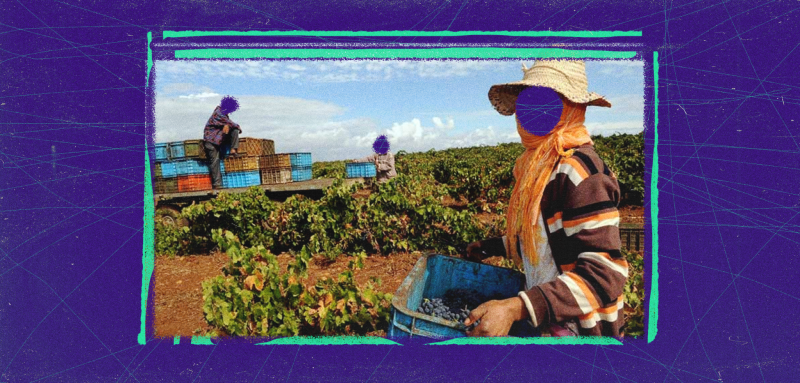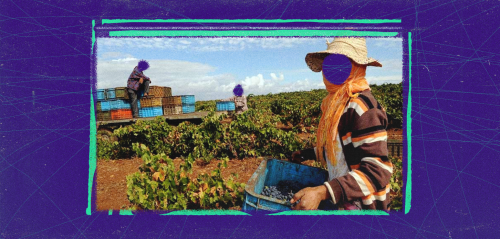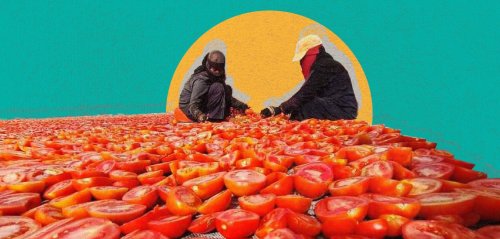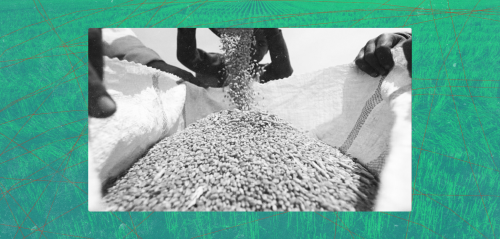"We are all deeply saddened and troubled to hear the news of a serious accident that took place when a car carrying thirty female agricultural workers working in one of the farms in Brachoua (western Morocco), overturned on the evening of Wednesday, March 29, killing 14 workers, while the rest were transferred to the hospital and are in critical condition, between life and death. Before we could even comprehend the situation, we received the next morning, on March 30th, the news of another accident involving a truck carrying female agricultural workers in the Belfaa commune in Chtouka-Aït Baha Province (southern Morocco), which left 26 agricultural workers with injuries of varying severity". With these words, the women's organization in the agricultural sector sounded the alarm because of what it described as a blatant "disregard for the lives of agricultural workers".
In a statement obtained by Raseef22, the women's organization in the agricultural sector confirmed that "these two accidents are just the latest in a long series of traffic accidents that dozens of female agricultural workers are exposed to, on their way to and from the workplace, and a regular basis," noting that "this category of women workers lacks the minimum conditions for a decent life and decent work, as they live under all forms of oppression, exploitation, violence and discrimination of all kinds, as well as the absence of health and safety conditions, which endangers their lives. Road accidents in which workers and female agricultural workers are killed occur continuously due to the use of dilapidated means of transport, most of which are intended for the transport of goods, and are overcrowded with female workers, thus exceeding the absorptive capacity. This also happens due to the lack of responsibility of road control which turns a blind eye to serious violations of traffic laws."
Women's organizations in the agricultural sector have sounded the alarm because of what they described as a blatant "disregard for the lives of women agricultural workers"
Difficult lives and simple demands
They are women whose difficult financial circumstances have pushed them to work long hours in risky conditions, and at low wages. They earn between 60 and 70 Moroccan dirhams ($5.7 – 6.6 US dollars) a day, without employment contracts and social security, in addition to enduring various forms of social stigma.
They perform a variety of tasks that farmers and farm managers deem appropriate for their physical composition, such as harvesting, removing weeds, and planting seedlings, among other tasks. As a result, they form an important link in Moroccan agricultural production, especially after the government's work on the "Green Morocco Plan", which structured agricultural and rural development between 2008 and 2020.
A series of road accidents that have repeatedly claimed the lives of many female agricultural workers have raised questions about their conditions and rights in Morocco
Fatima Zahra Najah, a member of the executive office of the Federal League for Women's Rights (FLDDF) in Ouarzazate (southern Morocco), says that "farm owners and transport service contractors must all adhere to safety and security standards during the transport of male and female workers, with the need to take the necessary measures to reduce the recurring road accidents, which have claimed the lives of a number of women workers on their way to and from work and due to the lack of suitable transportation conditions."
"It is necessary to enforce strict monitoring on transport service contractors to comply with safety and security conditions, and not exceed the permissable number of passengers during the transport of female workers, while constantly monitoring the means of transport, as well as the need to improve the working conditions of women workers in agricultural farms, and the proper application of the provisions of the Labor Code in the agricultural sector", Najah adds in her interview with Raseef22. She stresses that "the responsible authorities must expedite the development of a comprehensive plan to stop all forms of precarious employment for women in the agricultural sector, while obliging all social parties to respect the 'employment relations' conditions guaranteed by the constitution, and the right to decent work recognized by the International Labor Organization (ILO) and human rights charters."
The civil activist, who is concerned with defending women's rights pointed to the need to "control and monitor the inhumane conditions that these female agricultural workers are transported in, which threaten their lives every working day."
The high risk of accidents
In a statement, the Moroccan Association for Human Rights (AMDH) had recently raised the alarm about "seasonal workers who travel to work on farms, including agricultural estates in the villages of Aït Imour, Agafay, Souihla and others, from the neighboring areas of Marrakech (southern Morocco)," stressing that they "work from sunrise to the late hours of the evening, for a low wage, and work under harsh conditions and long hours under the scorching sun and the high temperatures in the region. They are exploited in a heinous manner, in conditions akin to slavery, in the absence of any monitoring or respect for their rights, in a blatant violation of their right to reasonable working hours, fair wages, social protection, and health care."
It should be noted that the statement of the Moroccan Association for Human Rights was issued after an accident described at the time as "tragic", even though it was less severe than the latest accident. Last September, an accident occurred at a road junction near Marrakech, resulting from a collision between a three-wheeled bike carrying eight female workers on their way to a farm, and a tow truck . The collision killed the bike driver instantly, while the workers suffered varying degrees of injuries and fractures. Two of the female workers died after being transported to the hospital in Marrakech on the same day.
Despite the continuous warnings by human rights organizations about the miserable conditions of women agricultural workers, and despite the repeated incidents of their deaths on the roads due to overcrowding in primitive means of transport, the inhumane conditions of their work still continue, and the human losses continue to repeat. This has prompted the MP for the Party of Progress and Socialism, Rachid Hamouni, to ask the Minister of Economic Integration, Small Business, Employment, and Skills, Younes Skouri, in a parliamentary session, to reveal "the measures that must be taken, in order to control and monitor the inhumane conditions through which agricultural workers are transported back and forth from a number of farms where they work, which threaten their lives every working day, while employers do not bear the necessary responsibility that would provide these working women with the most basic rights represented by means and conditions of transport befitting their humanity."
Forgotten women who contribute to key development
"Unfortunately, every year we hear about two, three or more accidents related to the collisions of vehicles transporting the workers of farms and agricultural factories, that do not respect any safety and health conditions, and the reason is that a group of government departments are not properly upholding their responsibilities with regard to the control of these transport vehicles," says the head of the Moroccan League for the Defense of Human Rights, Adel Chikito, to Raseef22, noting that the "responsibility in such accidents is complex, and involves both the Ministry of Transport, which grants licenses for the transport of these women, and law enforcement officers who monitor the roads, such as gendarmes and police officers who should stop such vehicles and ensure that they meet safety conditions."
"The responsibility for the recurrence of these tragic incidents also fall on labor inspectors, who must, throughout the year, carry out regular inspections of such vehicles, in order to compel their drivers or the owners of agricultural estates to respect the conditions stipulated in traffic laws", Chikito adds, noting that "Morocco, within the framework of its general labor policy, has ratified a set of conventions issued by the International Labour Organization (ILO), and participated in the last conference, which, among other things, called for the principle of 'health safety', and therefore national laws must be aligned with these principles."
Although they work hard for long hours and accumulate years of experience, these women have rare opportunities to advance at the professional level, unlike many men who start in simple jobs but quickly improve their their conditions and status, gradually taking on tasks as "caprans" (a local name given to the person responsible for managing and mobilizing workers), guards, or machine operators, so you find these women workers continuing to work on various farms, for low wages and minimal rights, including being piled up in large numbers in pickup trucks or trucks meant for transporting goods, in order to transport them to farms, with them bearing the transportation costs. And although some of them have paid the price with their lives for the difficult living conditions they live in, there seems to be no end in sight as the dire situation continues, and the authorities continue to turn a blind eye.
Raseef22 is a not for profit entity. Our focus is on quality journalism. Every contribution to the NasRaseef membership goes directly towards journalism production. We stand independent, not accepting corporate sponsorships, sponsored content or political funding.
Support our mission to keep Raseef22 available to all readers by clicking here!
Interested in writing with us? Check our pitch process here!








Join the Conversation
ذوالفقار عباس -
1 hour agoا
Hossam Sami -
2 hours agoصعود "أحزاب اليمين" نتيجة طبيعية جداً لرفض البعض; وعددهم ليس بالقليل أبداً. لفكرة الإندماج بل...
Anonymous user -
1 day agoرائع و عظيم ..
جيسيكا ملو فالنتاين -
5 days agoزاوية الموضوع لطيفة وتستحق التفكير إلا أنك حجبت عن المرأة أدوارا مهمة تلعبها في العائلة والمجتمع...
Bosaina Sharba -
1 week agoحلو الAudio
شكرا لالكن
رومان حداد -
1 week agoالتحليل عميق، رغم بساطته، شفاف كروح وممتلء كعقل، سأشاهد الفيلم ولكن ما أخشاه أن يكون التحليل أعمق...